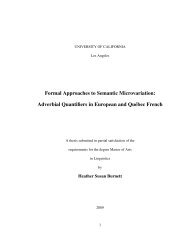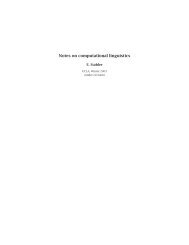A Grammar of Miya - UCLA Department of Linguistics
A Grammar of Miya - UCLA Department of Linguistics
A Grammar of Miya - UCLA Department of Linguistics
Create successful ePaper yourself
Turn your PDF publications into a flip-book with our unique Google optimized e-Paper software.
: i<br />
! i<br />
274<br />
A <strong>Grammar</strong> <strong>of</strong> <strong>Miya</strong><br />
both elicited and textual, the only examples available for the koo- + Q word form have the<br />
antecedent bound to the subject position within the modifying clause. Based on<br />
comparable structures from Hausa and other Chadic languages, I have no reason to believe<br />
that a koo- + Q word antecedent could not also be bound to other noun phrase positions.<br />
As for a difference in meaning between the two structures, I argue in 9:§§5.1-2 that tbe<br />
koo- + Q word structure attains a universal/generic interpretation by ranging (exhaustively)<br />
over a set meeting the criteria expressed here by the relative clause, whereas the ndyaam X<br />
bd form attains a universal/generic interpretation by referring as a whole to a set which<br />
meets the criteria. The examples below are arranged according to the position bound within<br />
the clause.<br />
Subject<br />
[k60weena ba zara Nduwy-eekiy], tg rna buws-uw<br />
'[no matter who calls Nduya], he will not come'<br />
[k60weenee jirkU ba Buwy-eekIy], t-aa gMm-uws aad,ma paratSg<br />
'[any monkey which sustains a fracture], he will climb up a Cassia tree'<br />
(more freely, 'even if a monkey sustains a fracture, he can climb a Cassia tree')<br />
[k60weena ba na doona-z-eekIy] dil tgra-tlil kabg rna war<br />
'[whoever is courting her] sews her a festival gown'<br />
[k60weeniy baa tJ d-aa lay akiin-was-eekiy] dg raBa zuw-ay<br />
anyone who he dOl-with son house-his-"ever"<br />
'[anyone who has a son in his household] ferments grain'<br />
[k60weena baa vgrk aakan-was-eekIy] dg 'ara ill-ay<br />
'[anyone with a son in his house] stocks up on beer'23<br />
[ndyaam baa dil zara Kasham], tg rna haya-w<br />
'[no matter who called Kasham], he did not answer'<br />
[ndyaam ba rgma 19bilasg], kwafa vilnuwsg ([ilm(a) aa ta'UWSg<br />
'[whoever eats an onion], well his mouth will make an odor'<br />
ndyaarn harn baa dil bmaya-t1gn], rna shg([ay<br />
'[whatever is spoiled], discard it'<br />
Direct Object<br />
[ndyaam baa dg zar(a) aa Ndilwya], tg rna haya-w<br />
all ba AUX call PS Nduya he NEG answer-NEG<br />
'[no matter who Nduya called], he did not answer'<br />
[ndyaan harn baa dil br(a) aa ita ba kIr] dil rna ([gma-ya amfaaniy-uw<br />
all thing ba AUX steal pln PS "possessor" theft Sjn NEG do-him use-NEG<br />
'[whatever a thief steals] will be <strong>of</strong> no use to him'<br />
23The generic clause <strong>of</strong> the preceding example and this one have similar, if not identical, meaning. The<br />
preceding one contains a real relative clause with a 'HAVE' construction (11:§4.3). The footnoted example<br />
contains a "possessor <strong>of</strong> ... " phrase (§5.1.1) rather than a true relative clause.<br />
------------------------ - ------------<br />
Indirect Object<br />
10. Noun Phrase Syntax (§5)<br />
[ndyaam baa miln bgla-ya litabiiariy], dil dgkaya maamaakiy<br />
all ba I tell-him news Sjn feel surprise<br />
'[whoever I tell the news to], he will be surprised'<br />
Locative<br />
[ndyaan ee dzaree laabaariy], dil dgka-y(a) aa silbg<br />
all where spread news Sjn hear-it PS people<br />
'[wherever he spread the news], the people heard it'<br />
Instrument<br />
[ndyaan harn baa dg wana kam-was aa t1i1m] j-aa dilyday-ay<br />
all thing ba AUX fill house-his with it Prt-with exactness-Tot<br />
'[whatever he fills his house with] it's just fine'<br />
Temporal<br />
[ndyaan l60kaciy baa dil nay-aarna] dil tgree-m(a)-ay<br />
all time ba AUX see-us Sjn greet-us-Tot<br />
'[whenever he sees us] he greets us'<br />
To conclude this section, I note the two following sentences from my data (all elicited<br />
examples) which do not fit the patterns above or the Id concessive pattern, even though<br />
they were volunteered as translations <strong>of</strong> Hausa sentences comparable to those above. They<br />
appear to be independent clauses in parataxis with the following clause.<br />
[k60mee dg kilmaya-t1gn], laa<br />
anything AUX spoil-Iep, you-Sjn<br />
'[(if) anything is spoiled], discard it'<br />
shg([-ay<br />
discard-Tot<br />
[k60wayya kunt-eekiy njg mbiyya], say day a bay-t1a rna muk-uw<br />
every eggplant-"ever" it red "unless" Pf carry-it NEG sun-NEG<br />
'[every eggplant is red], unless it hasn't been taken into the sun'<br />
5.3.BA/MAISaBAwith other sentential complement types. Section §S.l describes<br />
complements to balmalsaba without a clausal structure. Section §5.2 describes relative<br />
clauses, i.e. clausal structures which are modifiers <strong>of</strong> nominal heads. Salma/saba can also<br />
head sentential complements which are not, strictly speaking, relative clauses. Consider<br />
the following example from a text:<br />
baa dilw samay nUW-SiJ dg ra ita casg ka<br />
who "quote" trash <strong>of</strong>-him AUX exceed in amount PRM<br />
'the one whose trash was the greatest in amount'<br />
The translation suggests that this is a genitive relative (§5.2.8), but structurally, the<br />
complement clause cannot be a relative clause. First, the AUX dj shows that the TAM is a<br />
Focused Subject Perfective (5:§2.2.2), i.e. the clause alone might be translated, "It was<br />
!ITS TRASH that was greatest in amount," a translation confirmed by the context, where the<br />
275<br />
-""
















